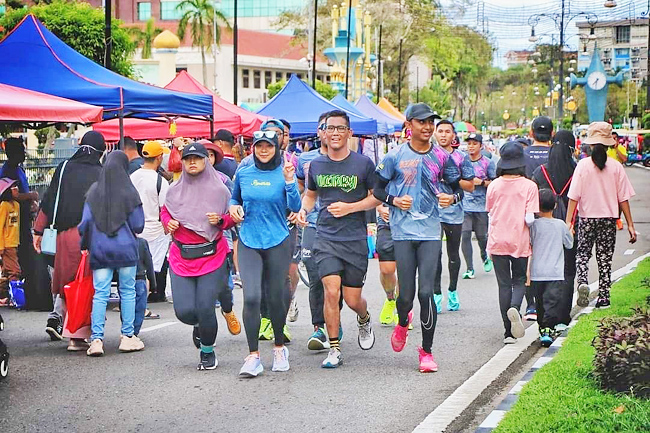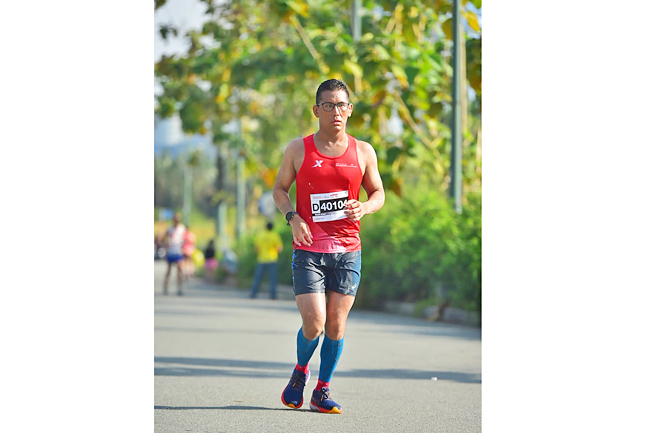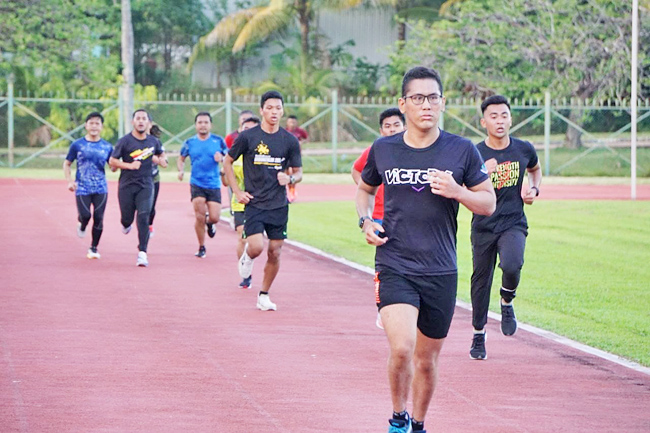Rokiah Mahmud
Belief and confidence are key for Haji Mohd Hasrin, who has taken part in three marathons so far.
The 29-year-old teacher at the institute of Brunei Technical Education (IBTE) shared his story in an interview with the Bulletin, recalling when he participated in his first marathon a few years ago.
During school years, he said he had asthma which often kept him from joining sports.
“My friends first got me interested in running, by inviting along,” he said. “Realising that my asthma problem was subsiding encouraged me to keep going.
“After two years of training and running, my asthma was gone and I further pursued my passion by joining a marathon.”
Hasrin said to become a marathon runner, one cannot just simply run, it requires proper training and dieting. “You also need to have the right knowledge before taking on any challenge,” he added.
It took Hasrin two years to prepare for a marathon.



“Even so, when I was standing at the starting line, I did not know if I could finish the race. But you have to believe in yourself. Don’t think too much and do what you can to improve your health and fitness,” he said.
“In terms of training, I am part of the Larian Tanpa Batas (Running Without Limits) group, comprising triathletes, marathoners and ultra-marathoners. There are also people who just started their health journey. We meet weekly at the stadium, and the sessions are usually meant to build up fitness. Anyone can join us,” Hasrin smiled.
Hasrin also shared that every workout has a specific purpose – not just endurance, but also to build strength, speed, mobility, flexibility and recovery.
When it comes to the diet, especially in preparation of a 42-kilometre marathon, Hasrin said, “In the few months, we try our best to get used to certain types of food, especially carbohydrates. For example, if we train in the afternoon, we eat foods containing carbohydrates at night to replenish our glycogen.
“And during the months of training, especially long runs that could take two or three hours, we must eat breakfast with a lot of essential fibre and carbohydrates.
“We also try to include a lot of vegetables as they help with recovery.
“From time to time, we do eat fast food, but we have to be mindful as to not consume too much. We treat fast food as a celebratory meal and a fix for our cravings,” he said.
Hasrin’s first marathon was the Standard Chartered Marathon in Singapore in December 2018.
“I didn’t plan on participating in any marathons at the time, but on that day, taking up the challenge made me feel that there were no limits to success.
“If you set a mental limit on yourself, such as saying that you cannot do it or come up with excuses, you cannot be where you want to be. You need to overcome all for your own good. Eventually, you will be confident, full of spirit and able to overcome whatever challenges you may face,” Hasrin said. “I always say to myself, ‘If you can overcome a marathon challenge, you can do better the next time’. This applies not only to running, but also your life.
“That confidence can lead you to bigger and better things,” he said, highlighting that completing the 42-kilometre run in one go drove him to join the next two marathons.
“My second marathon was just before the pandemic in Chiang Mai, Thailand in 2019. That was a huge mental game for me because after completing my first marathon, I wanted to see if I could run faster – which I could.
“During the pandemic, we could not do much training in groups and I had to train by myself, which was difficult for me,” Hasrin said.
He got back to marathon training in 2022, though his body needed to re-adjust since he had been dormant for two years.
The weight he gained in the two years contributed to a lot of suffering, Hasrin said. So he began to question himself as to whether he had the ability, strength and willpower to join a third marathon.
With the support of the people around him, he was able not only to overcome the inertia, but also whatever issues he was facing.
“A few days before my third marathon in Vietnam, I told my coach I would like to take it easy and see how it goes,” he said.
“At the starting line, there were nearly 2,000 participants with the same goal of finishing the marathon with the best they got. Knowing that you were not alone was one way of overcoming the suffering to finish the run.”
There are a lot of obstacles in both the marathon and training, Hasrin said.
“One is demotivation, especially when you don’t want to run because your body is tired. There will be bad days, or factors that contribute to your tiredness.
“I am a full-time teacher so there are days when I work overtime and am tired. I have to drag myself to the stadium for training. It is difficult, but I keep telling myself that 50 per cent of the problem will go away if I start running,” he said.
“There are also times where it is hard to drag your feet, or your friends don’t want to join in.
For me, I just need to start running. Eventually the adrenaline will kick in, and your energy level will go up and things will become better once the run is done.”
Taking up running is a challenge he has to conquer. As fit as he is, Hasrin needs at least two to three days to rest after a marathon challenge.
To him, all the obstacles are not enough to keep him from pursuing his dream of becoming a successful marathoner.
“We may encounter obstacles that may influence our thoughts, but if I listen to them, I will never be where I am now; and that boosts my confidence.”
Hasrin wants to improve on his marathon achievements, to not only finish fast but to achieve his personal best. “Finishing a marathon is not the end goal; it’s more important to improve your time to run in a five-kilometre run.”
His best time is four hours and 43 minutes – which equates six minutes and 39 seconds per kilometre. He achieved it during a marathon in Vietnam.
“It took me five hours and 45 minutes at the marathon in Singapore. So it was an improvement of an hour!” he said.
For those interested in taking up running, Hasrin shared that he has met a lot of people who are inspiring such as those having never-say-die attitude to losing weight.
“Meet them, get inspired. The rest will follow suit,” he said.



















































